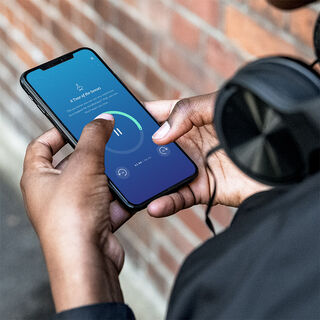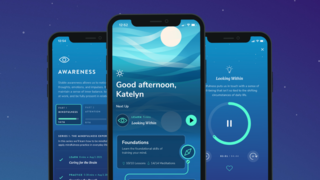Meditation
6 Tips for Finding a Meditation App That Works for You
A scientist's perspective on how to find the right meditation app.
Posted July 15, 2022 Reviewed by Tyler Woods
Key points
- Meditation apps account for 96% of mental health apps being used in the past month.
- The best way to find a meditation app you like is to try one, even if that means trying out many.
- It can be helpful to think about a meditation app as just another tool in your mental health toolbox.

By Simon Goldberg
Mental health apps have become a big business. There are now over 10,000 mental health apps available, offering a dizzying array of approaches and promises to improve your mental health. Of the wide variety of apps out there, meditation apps are particularly popular, by some estimates accounting for 96 percent of those using a mental health app in the past month.
When a particular type of content is predominant within a market already valued at over $1 billion (and only projected to grow in the coming decade), one might naturally be curious about what the big deal is. It’s also likely you’ve tried a meditation app or that someone you know—maybe a friend or therapist—suggested you try one.
If you’ve found a meditation app that works for you, that’s great. Stick with it. Like so many health-related habits, it takes effort to stick to our commitments, even to things that we know may be helping us. There are lots of strategies that can be used to build healthy routines that you might want to explore (for example, scheduling times to meditate, anticipating barriers that might get in the way, and what personal values motivate you to continue).
But what if you haven’t found a helpful meditation app? Or what if you just don’t know where to start looking? Here are some things you might consider:
Ask around
Just like if you were looking for a recommendation for a good restaurant or a fun movie to watch, ask people in your network if there are meditation apps they recommend. People you know are probably similar to you in some ways and may very well appreciate the same things in a meditation app that you would. If someone has a particular recommendation, ask what they like about that app and see if it sounds like something you might find helpful as well.
See what people are saying
Getting opinions from outside your network can also go a long way. Ratings featured on app stores provide an easy way to get an overall star rating, as well as a chance to review comments left by other users. The major advantage here is that you’re getting opinions from sometimes thousands or hundreds of thousands of folks, so you can feel pretty confident that these are accurate estimates of how most people find a particular app. That said, ratings can also be biased and influenced by things like advertising budgets. You might also explore some of the expert-developed reviews (such as mindapps.org or onemindpsyberguide.org) designed to give a more objective evaluation of the pros and cons of many available apps. These websites discuss things like the evidence base and data privacy policies which may be more challenging to track down on our own.

Try it and stick with it...but not too long
While these ratings and comments can be helpful, I’m sure many of us have had the experience of buying something online despite mixed reviews and finding we love the product in the end. That is to say, your experience with a particular meditation app may not match the average experience captured on the app store ratings.
So, the best way to find a meditation app you like is to try one. If you have practiced meditation before, you may be able to determine pretty quickly whether the app you’re using is a good fit. But, if you’re new to both meditation and meditation apps, it may take some time to really get a sense of whether it’s helpful to you. You might experiment with using a new app once a day for a week and evaluate at the end of the week whether you think you’d like to continue. If you’re feeling like you’d like to move on and try something else, go for it. At least you’ve given that particular app a shot. It’s nice that many meditation apps have free trial periods and some even provide their full content at no cost.
Have reasonable expectations
Meditation can be difficult, particularly when first getting started and if we’re coming to meditation with a lot of difficult emotions. Things like depression, anxiety, a history of trauma, and high levels of stress can make the actual moment-to-moment experience of meditation fairly unpleasant and intense. While there is good evidence that meditation can improve many common mental health concerns, such as depression and anxiety, it typically doesn’t do that overnight. It can be helpful to think about a meditation app as just another tool in your mental health toolbox. It can be powerful, but may not be a straight line to a stress-free life or recovery from depression.
Get live guidance and support
If you find yourself getting overwhelmed in your initial explorations, it may be time to get some support from a qualified guide. Some apps offer opportunities to connect with experienced meditation teachers. In other cases, it may be more helpful and appropriate to connect with a therapist, for example to help with processing traumatic experiences from the past. While meditation apps may still provide valuable support, they may function best as just that—a support—rather than the main feature of your mental health plan.

Try something else
I’m a big fan of meditation. With rare exception, it’s something I try to do every day. But, I’m pretty convinced that meditation is not for everyone. The good news is there are many scientifically validated ways to improve your mental health that have nothing to do with meditation. If you’ve done some exploring and haven’t found a meditation app or meditation practice that seems to work for you, try something else. Getting exercise and social support from friends and family are two of the most reliable ways to boost mood, fight common mental illnesses, like depression and anxiety, and even increase longevity. And with any extra time you’ll be adding to your life with all that exercise and social support, maybe you’ll want to explore meditation again later in life.
Simon Goldberg, Ph.D., is an assistant professor in the Department of Counseling Psychology and a faculty member at the Center for Healthy Minds.




